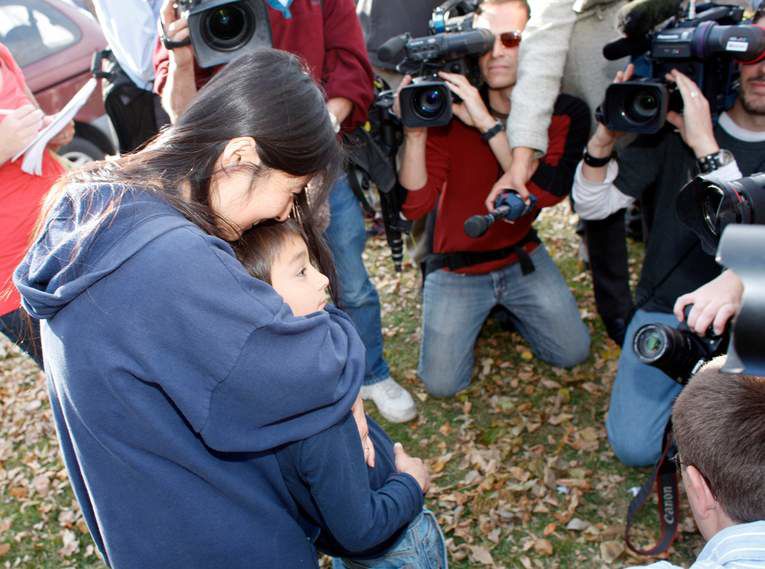Seeking out the spotlight has become an obsession for many
Published 5:00 am Thursday, October 22, 2009

- Falcon Heene, 6 — now known as “balloon boy” for his role in an apparent hoax — is hugged by his mother, Mayumi, as television photographers crowd around them after a news conference outside the family's home in Fort Collins, Colo., on Oct. 15.
KANSAS CITY, Mo. — Four decades after Andy Warhol predicted a future of everyone being famous for 15 minutes, some are feeling cheated.
What, only 15 minutes?
Tom DeLay, who left Congress under a cloud of scandal, tried to stretch a return to the spotlight into an entire TV season. But his feet failed him on “Dancing With the Stars.” Rod Blagojevich? His lawyers were in court Monday trying to keep his date with TV’s “The Celebrity Apprentice.”
Enter the Heene family of Colorado, alleged perpetrators of what all of the Web has dubbed the “balloon boy” incident. Having appeared on the ABC show “Wife Swap,” Richard and Mayumi were angling for another shot at reality TV by concocting the live drama of their trapped, floating 6-year-old son, investigators contend.
Another Colorado man grabbed attention of his own by selling to the Web site Gawker an account of how he supposedly helped Richard Heene draw plans for a UFO hoax using a weather balloon.
Why? “To get famous, of course.”
Given our huckster culture, and the technology available to it, experts said they understood how the artist Warhol lowballed the time frame for fame.
“Back in his day you only had three TV networks,” said media historian J. Fred MacDonald. “Now you have hundreds of channels and all these poor programming directors looking for absolutely anything that gives them a little splash in the puddle. … So your story has a much better shot at being picked up.”
Blagojevich gets it. The ousted Illinois governor wants a judge to allow him to fill out the spring season of “The Celebrity Apprentice,” since his trial on corruption charges won’t start until June.
It is too early to know whether the Heenes will return to prime time. If they do, they will not be the first to parlay an alleged hoax into enduring notoriety.
“Some people want to be known as the person who outsmarted the masses,” said Benjamin Radford, managing editor of Skeptical Inquirer magazine. “The two men in Georgia who claimed to have discovered the Bigfoot body? They must’ve known at some point they weren’t going to get away with it.”
It turned out to be a rubber ape suit in a freezer, creating much derision last year.
“But in their mindset, they’re the smart ones,” Radford said. “They got all that attention.”
Research into a global phenomenon
Fame-seeking, or what some behavioral researchers call “the fame motive,” until recent years drew scant attention from scientists. They used to consider desires for attention too shallow an impulse to take seriously; it’s what children did when throwing food.
But the growing ease at which anybody can seek fame — by losing weight on reality TV or posting a provocative video on YouTube — has given rise to in-depth books such as “Look at Me! The Fame Motive From Childhood to Death,” by human-development scholar Orville Gilbert Brim.
Brim’s research found that for roughly 5 million Americans, becoming famous is the most important goal in life.
The desire is global. About 30 percent of German and Chinese adults report regularly daydreaming about fame.
“We all want to feel significant and valuable. … The idea of achieving a fame that keeps your name alive after your death goes back to ancient Greece,” said University of Arizona psychologist Jeff Greenberg. “The difference now is you don’t have to do anything particularly remarkable. The availability of the mass media and the Internet makes achieving fame more feasible.”
And once you’ve had a taste of it, as the Heenes did on “Wife Swap,” the effect can be addictive, some said.
“Half of this country wants a reality show of their own,” said Syracuse University professor Robert Thompson, an expert on TV and popular culture. “The problem is there are 300 million of us.”
He added: “Andy Warhol was wrong. If we could all be famous even for 15 minutes, fame would lose its appeal. The reason it’s such a narcotic is few people get it.”






